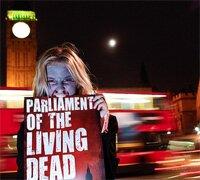We need to push electoral reform
Reform, change, improvement. These are words that are all important to us as voters and concerned citizens regardless of where we live and what our circumstances are. Unfortunately, as Nick Robinson states, politicians in the UK have got a hold of these words and made them mean something less than they are. While Barack Obama invigorates his campaign along with the hopes and aspirations of millions of Americans with the simple word “change”, it is getting to the stage on British shores that claims of reform are met with sideways glances and the rolling of eyes. “I’ll see it when I believe it,” says Nick, and I’d be surprised if he was alone in this way of thinking.
With the current vacuum of any real reform despite all of the talk at the beginning of Gordon Brown’s premiership, now is the perfect opportunity, as Sunny said on CiF last week, for those on the liberal-left to truly push reform forward.
At the very top of this list should be electoral reform.
I want to take you back in time, to 1969. This is the last time Britain saw meaningful reform on making the process of elections fairer by lowering the voting age to 18 for all eligible men and women in the UK. Twenty years earlier academic votes were abolished, twenty years earlier again women were given equal rights to men in voting. It seems the rate of necessary reform has begun to stutter and stumble since 1969.
Proportional Representation (PR) advocates have long awaited for an official line on electoral reform and, being ten years in the making, Michael Wills’ statement on behalf of the Department of Justice is very much a damp squib. Mr Wills and his colleague Jack Straw have unfortunately brought the debate to a dead end with fairly empty promise, if you can even call it that, of when the process might continue.
This is all the more surprising given this review is so long in the making. Take a look at the time line of discussion:
1997 – Labour manifesto pledges a referendum on electoral reform.
1998 – Jenkins report suggests what is now known as AV+.
1999 – Tony Blair is said to be welcoming of the report but Jack Straw is dismissive of it.
2001 – No referendum held by previous government, emphasis is now on gathering data from working PR practices in devolved assemblies (Labour 2001 Manifesto).
2001 – A MORI poll suggests that turnout levels are not to do with disinterest in politics, but with how campaigning affects voters and how easy it is for them to take part in the process
2003 – The Electoral Reform Society (ERS) produce a paper investigating the causes of low turn out from their perspective, a main proponent of which they believe to be a disenfranchisement of the First-Past-the-Post (FPTP) system. It also puts forward evidence of public support for a change to PR.
2003 – The Independent Commission on Proportional Representation produce a report, “Changed Voting, Changed Politics”, that corroborates the ERS findings on public opinion being in favour of a more representative house of commons, and is also the first comparative report based on data from devolved assemblies. It does suggest that PR isn’t a magic solution to turnout, which corroborates the MORI survey that it is the process of engagement that matters most in getting people to vote.
2004 – The ERS report in to voter turnout further emphasises that availability of ways to vote, education on the benefits of voting combined with a lower minimum voting age to help sustain “habitual” voting, and engaging voters on appropriate levels will be the key ways to increase turn out sustainably. It also cites the need for a PR system to maintain trust in the process.
2005 – An article for Parliamentary Affairs (London School of Economics and Political Science, LSE) shows that the state of electoral systems in 2005 is suffering from the same problems as the 1997 and 2001 elections without necessary reforms taking place. It also claims that the 2005 election could seem more succesful than it was due to postal voting, a positive initiative for engaging voters.
2006 – Power To the People shows that the balance of power needs to return to the people, as well as suggesting a swathe of reforms to bring engagement in the voting process back up to pre-97 levels.
2007 – Another report by the ERS revisits the investigation of electoral reform in several aspects of UK governance. In particular it is the most damning report to date against the FPTP system. It’s strength, however, is in its setting down what it sees as necessary to take the next step and start the process of change. The report shows that simple referendums are as much a tool to keep a bad system than to change if not presented properly.
2008 – the report Review of Voting Systems compares all data available of devolved assemblies to date with potentials for reform. It fails to make a recommendation on the direction for government, the first report in a decade of serious investigation of PR to not do so. What it does do well is fill in the gaps of knowledge that the 2007 ERS report claims need to be investigated before reform can start with integrity.
Despite all this, Mr Wills has stated:
It remains the Government’s strong view that since the voting system for Westminster Commons elections could fundamentally change the way parliamentary democracy operates, any proposed changes would need to be endorsed by a referendum. At this point, it would be premature to seek to reform the electoral system for the Commons while the voting system for a reformed and substantially or fully elected House of Lords is still to be determined.
This latest review has taken the best part of 7 years to complete following devolution and yet ultimately the government is in the same position it was before the review took place. It is clearly unwilling to even debate the issue until it wins its fight over House of Lords reform, an outcome that could easily be years away from being settled and almost certainly not until after another general election.
What makes this outcome most offensive to the general public is the suggestion of a need for (but not of intent to deliver) a referendum on the issue, a decade after the original promise in the 1997 Labour manifesto. No doubt the issue is vastly more informed now, but the stance of PR advocates has only been strengthened in the wake of all of the research and it would be hard to not feel like we’ve wasted the opportunity for fair representation twice already.
So what can we on the ‘liberal left‘ do?
The priority now is on making the process go forward: lobbying MPs to question the Ministry of Justice as to why they’ve not set out a time table and are delaying indefinitely based on a separate set of reforms.
The argument is there to be won for a change to PR systems, but the argument needs to take place now. With Charles Clarke even admitting the future direction of New Labour is uncertain, it is important we highlight how true that statement is.
—————–
This is a guest post.
Lee blogs on Griffindor.
-------------------------
| Tweet |
Lee is a 20 something web developer from Cornwall now residing in Bristol since completing his degree at the lesser university. He has strange dreams, a big appetite, a small flat, and when not forcing his views on the world he is probably eating a cookie. Lee blogs independently from party colours at Program your own mind.
· Other posts by Lee Griffin
Filed under
Blog ,Labour party ,Our democracy ,Westminster
9 responses in total ||
Why would Labour seek a change to the Westminster electoral system when they can get a working majority with 20% of the eligible vote?
Having said that a new voting system is not going to be a panacea for falling turnout, or better governance. The clinching argument must be that it is fairer and better reflects the wishes of the electorate. For every argument that (used) to claim ‘West Germany has PR, it’s an economic miracle, therefore let’s have PR here’ the reverse could be said of (e.g.) Italy with nigh on a new government each year.
I didn’t have time to add when posting this article before a couple of links that I think should be read along side this. Here is a history of where we are, Neil Harding does a real good job of representing my view on where we should ideally go and also has a letter he’s written to Michael Wills on his site too.
But you’re right, as I said in the post report after report shows that barriers to turnout are usually systemic, but there is a real argument to be had about marginality of constituencies. Compare 30% turn out in Britain’s safest seat to 70% in Britain’s least safe seat. These are also trends rather than anecdotes, and trends much more easily reversed if a second or third pass on transferable voting means that there is a likely close race for the eventual winner at some point in the result counting.
As for why they would change? I think that when the voting starts happening and the realisation sets in that popular opinion of their party can no longer guarantee them power through disproportionate results, and when their share of parliamentary seats would seemingly be closer to their popular vote (as with the Tories currently), the incentive for keeping the system is drastically diminished. But right now I agree there is little that can persuade what is obviously a government and parliament growing increasingly fond of building a fort of ultimate power.
But do read Neil’s stuff that I linked to, it’s a great piece to go along side this one.
What makes this outcome most offensive to the general public
Frankly, I doubt that the general public could care less.
LiberalHammer, I don’t think it is a clinching argument that “it is fairer and better reflects the wishes of the electorate”.
Persuade me that it will give me a better government, or a freer country, not that it is “fairer”.
I think that the US Constitution and federalism, for example, have much to be said for them, but not because they make anything fairer. They are good because they make America freer.
Change in theory is all well and good, but you have to ask what it means in practise.
The dual risks of a change in electoral process are that it may upset the current blocs too much to be worth their while introducing it, or that any newly established paradigm will become far more concrete and far less responsive – the consequences of which we can see in Italy for the former and Germany in the latter – is either actually more desirable in fact?
False change and failed change can be far more damaging than no-change-at-all, so while we are undecided or unconvinced, let’s continue the debate until we are sure.
It does, however, speak volumes about the continuing evolution of the legislative programme of the current government that proposals for any change have gained impetus in place of any agenda for real and effective change: they have nothing more to offer and are clinging on by their fingernails.
Hmm, interesting that you would describe America as more free #3. I personally wouldn’t describe a political system that allows a lower life span and higher poverty to be much more free, but then I am guessing here that we’re talking about partisan ideals rather than legitimate systems as this article is about. I would agree, simply saying it is more fair isn’t enough. It is certainly a good starting point to engage with people, but explaining how it means local representation from MPs that previously didn’t need to give a shit about their constituents, and how it diminishes the ability for policies that are perhaps unpopular (say, referendum on the EU?) to simply be pushed through parliament with threats by party whips will go a long way into peoples minds I feel.
My personal feelings on the matter regarding #4 is that you shouldn’t be afraid as a government to fall in to the scheme that Germany finds itself in as long as certain things are rectified. Public involvement in the processes (more and better consultations) is paramount to a “fair” system, and the establishment needs to accept that the public, assuming they vote as such in a referendum, want effective policy making not party political policy making. You can have the same divisions of parties going throughout the whole of time with little or no change of power quite happily as long as you accept that parliament is no longer a place for you to force through your agenda while in power, rather that it is a place for proper representative debate to get the best policy that is possible from what is submitted.
I’d say that the campaign body needs to mobilise more, the ERS and Make my vote count campaigns are stagnant, probably through nothing of their own doing, and the next set of local elections nationally would be a great place. You can visit a vast swathe of constituencies in this country and truly engage with people about how much their vote counts, not only locally where you can easily make the case for 20+% of the population simply wasting their votes, but also nationally where up to 50% of the constituency might as well have just voted labour in the first place.
Dealing with people that already vote is the key to change, about educating them that their vote in Liverpool is worth less than their vote in Winchester, and therefore money is spent on placating and benefiting the agendas of those areas first. Once change happens, once marginality largely becomes a thing of the past and once local levels of campaigning increase because of the importance of securing your first AND second choice votes, then you can start assessing what else needs to be done to bring your turnout up. And remember all the research shows that more local campaigning increases not only the votes for your party, but also the turnout.
Having lived in a highly rural village, as well as a small country town, an typical suburb and an inner city ghetto I can say that for each area the problems are different and so too are the solutions.
I have been engaged with local debates throughout my life and have found similar situations arise everywhere.
What I’ve always found damaging is the artificial imposition of political theory as a means of describing the existing community in order to manipulate opinion and thereby try to create conformity.
It is not voter turnout that is itself directly problematic, but what this reflects – otherwise we’d all be up in arms that our MPs vote so little in parliament.
People are engaged with issues, but at different levels of specialisation and expertise.
We can’t and shouldn’t expect everyone to be perfectly informed on every issue in every corner of society and the country, that is simply unrealistic.
No, the problem is that the structures of government fail to take this human imperfection into account by failing to enable decisions to be made where is most appropriate and in a way that responds to the needs of all the people to be affected by them.
Electoral structures are a by-product of governmental structures (not the other way round) – so the idea we can continue to percieve central government as the key-holders to all the answers is based on a flawed precept, instead we should be more accepting of the reality of a diffuse patchwork of governmental powers at different levels and get on with sorting out how to integrate the different bodies pragmatically.
In my way of seeing things, providing multiple ballots on multiple issues at the same election would attract more people into the polling station in the first place, from where it is clearly an obvious step to use that opportunity to vote on issues of secondary importance to any particular individuals (notably many US states take the opportunity of national elections to also have federal refereda on seperate issues).
Devolution in practice is a process, not an event.
It is a process by which everything from the local parish council to the UN links in to an understanding of representative accountability.
We all still have a long way to go before we actually get there – let’s just hope it doesn’t take a new set of global conflicts to force our submission to the inevitable.
http://conservativehome.blogs.com/centreright/2008/02/its-not-just-sl.html goes not quite far enough in his suggestions, but then I don’t expect anyone on CentreRight to flag up electoral reform as an option ![]()
Electoral reform – either pure STV or AV – would shift effective power away from the two big party machines. So what real incentive do either Labour or Conservatives have for introducing it?
Labour’s incentive would quite simply be to halt the decline of their power to some level. There has to be a point at which they realise that they’re on the down and that there are only so many years it can go before Tories take advantage of the inadequacies of the system and remain in power artificially.
Surely coalition power is better than just being the party opposite? Whether they have the balls and the brains to understand this is another thing.
And aside from this if the system was changed now Tories wouldn’t lose any power because they’re pretty much proportional right now, the only party to be so in the parliament. But of course being on the way up I can see how they’d prefer to not stay so proportional.
Reactions: Twitter, blogs
Sorry, the comment form is closed at this time.
You can read articles through the front page, via Twitter or RSS feed.
» John Pilger shames himself by attacking feminists over Julian Assange
» Why Labour was right to reject Bob’s drug policy
» Ten myths about housing benefit reforms in London
» What if Superdrug lived up to its name?
» Why we want to ‘recall’ Aaron Porter as NUS President
» Breakthrough in drugs debate as MPs call for full decriminalisation
» Report shows how the promise on NHS spending has been broken
» Why climate talks in Cancun failed miserably
» Why cuts to local councils will be much worse than Tories suggest
» Left unity and the bid to oust Aaron Porter
» The true horror of NHS privatisation is slowly coming out
|
19 Comments 15 Comments 4 Comments 15 Comments 46 Comments 39 Comments 34 Comments 19 Comments 33 Comments 34 Comments |
LATEST COMMENTS » Luis Enrique posted on John Pilger shames himself by attacking feminists over Julian Assange » Luis Enrique posted on John Pilger shames himself by attacking feminists over Julian Assange » donpaskini posted on Ten myths about housing benefit reforms in London » Dunc posted on Why Labour was right to reject Bob's drug policy » Richard W posted on John Pilger shames himself by attacking feminists over Julian Assange » Tim Worstall posted on Why Labour was right to reject Bob's drug policy » Tim Worstall posted on Why Labour was right to reject Bob's drug policy » Mr S. Pill posted on John Pilger shames himself by attacking feminists over Julian Assange » Mr S. Pill posted on John Pilger shames himself by attacking feminists over Julian Assange » Watchman posted on I know how let down Libdems must feel » Torquil MacNeil posted on John Pilger shames himself by attacking feminists over Julian Assange » Dunc posted on Why Labour was right to reject Bob's drug policy » Torquil MacNeil posted on John Pilger shames himself by attacking feminists over Julian Assange » BenSix posted on John Pilger shames himself by attacking feminists over Julian Assange » cim posted on John Pilger shames himself by attacking feminists over Julian Assange |















